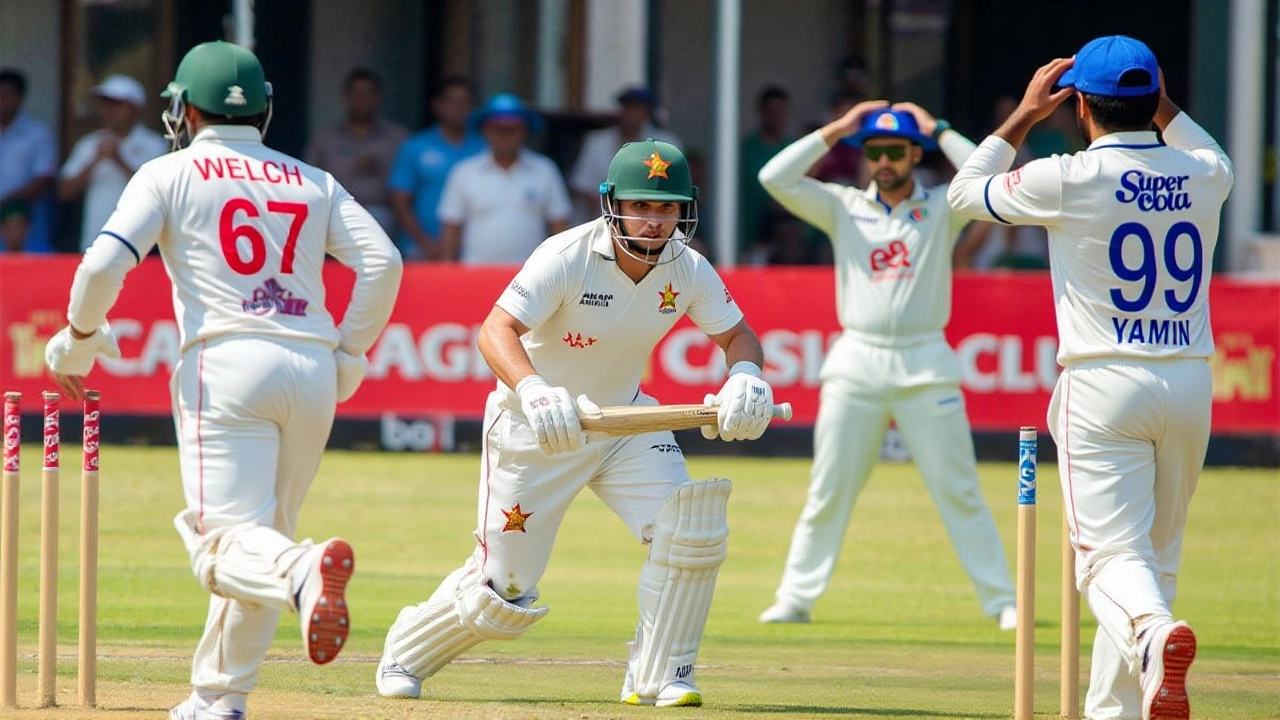When Fakhar Zaman launched the first six of the night at the Karachi venue on November 18, 2025, it wasn’t just a shot — it was a statement. Pakistan, under pressure to prove they could still host high-stakes cricket at home, had just lost three wickets in the Powerplay and were reeling at 31 for 3. But Fakhar’s 44 off 32 balls, mixed with calm finishing from Mohammad Nawaz (22 not out), turned a shaky chase into a 5-wicket win over Zimbabwe in the opener of the 2025 Pakistan T20I Tri-Nation Series. The win gave Pakistan 2 crucial points, while Zimbabwe walked away empty-handed — a result that felt bigger than the scoreboard suggested.
From Collapse to Comeback: Zimbabwe’s Rollercoaster Innings
Zimbabwe started like a team on fire. Brian Bennett, the burly all-rounder, smashed 49 off just 36 balls, and with the openers putting on 91 without loss in under six overs, it looked like they’d post 190+. But then, the wheels came off. Three wickets fell for 10 runs in 12 balls — including a stunning caught-and-bowled by Nawaz that sent the home crowd into a frenzy. By the 18th over, Zimbabwe had lost 7 wickets for just 56 runs. Their final total of 147 for 8 was, as ESPNcricinfo put it, “below par.” The Powerplay had been a dream — 59 without loss — but the middle overs became a nightmare. Brad Evans, Zimbabwe’s best bowler, took 2 for 26, but even he couldn’t stem the tide.Pakistan’s Chase: Nerves, DRS, and Nerve
Pakistan’s reply began with chaos. The Powerplay ended at 31 for 3 — Babar Azam, the captain, was given out lbw on the fourth ball of the third over. But here’s the twist: Pakistan challenged. The DRS review showed the ball was clipping the edge of the bat, not the pad. Umpire Rashid Riaz’s original decision was overturned — “Umpire’s Call” on ball-tracking. It was a turning point. The crowd roared. Babar survived. And suddenly, the pressure shifted. Fakhar took over. He hit five fours and two sixes, playing with the swagger of a man who knows he’s carrying the team. His partnership with Nawaz — 73 runs for the fourth wicket — was the difference. Nawaz, usually a spinner, batted like a finisher, guiding Pakistan to 151 for 5 in 19.2 overs. The win wasn’t pretty, but it was smart. And it mattered.Why This Series Matters More Than the Points
This isn’t just about winning a tri-series. It’s about proving Pakistan can still host top-tier cricket after years of playing home games in the UAE due to security fears. The Pakistan Cricket Board (PCB), led by Chairman Zaka Ashraf, has spent millions revamping stadiums and security protocols. This series — with Sri Lanka and Zimbabwe as guests — is a litmus test. The original plan included Afghanistan, but they withdrew on October 17, 2025, citing cross-border tensions. The PCB moved fast, replacing them with Zimbabwe — a team with less clout but more availability. The decision was pragmatic, not political. And now, with 10 matches scheduled across Pakistan through November 29, the PCB is betting big on momentum.The Ripple Effect: A Glimpse of the 2026 World Cup
The 2026 Men's T20 World Cup is less than 18 months away. For Pakistan, this series is a rehearsal. For Zimbabwe, it’s a lifeline — they’ve lost 11 of their last 13 T20Is. Sri Lanka, who crushed Zimbabwe by 67 runs in their opener (162 for 8 vs. 95 all out), are clearly the favorites. But Pakistan’s win here sends a signal: they’re back, and they’re hungry. The November 20 match at Rawalpindi Cricket Stadium will be another checkpoint. Match referee Reon King (West Indies) and TV umpire Asif Yaqoob are back on duty. The stakes? Higher than ever. A win for Pakistan could set up a final against Sri Lanka. A loss? The pressure mounts.
What’s Next? The Road to the Final
The tournament follows a double round-robin format. Each team plays the others twice. That means Pakistan will face Sri Lanka again on November 23 in Lahore, and Zimbabwe on November 27 in Multan. The top two teams advance to the final on November 29 — likely in Karachi. For Zimbabwe, the path is steep. They lost to Sri Lanka by 67 runs — and now, after being outplayed by Pakistan, they need to win both remaining games just to stay alive. Their captain, Sikandar Raza, admitted after the match: “We have to find a way to hold our nerve. We showed we can bat. Now we need to bowl better.” For Pakistan, the challenge is consistency. Their top order still looks fragile. But Fakhar and Nawaz gave them something they haven’t had in recent T20Is: a finisher’s touch and a captain who stays calm under pressure.Behind the Scenes: The PCB’s Quiet Victory
Let’s not overlook the real winner here: the Pakistan Cricket Board. After years of being sidelined from hosting, they’ve pulled off a full international series with zero major incidents. No protests. No security breaches. Just cricket. And crowds. Thousands packed the stands in Karachi, waving flags, chanting names, and singing the national anthem louder than they have in a decade. It’s a quiet triumph. But it’s the kind that rebuilds confidence — in the players, in the fans, and in the world’s view of Pakistan as a cricketing nation.Frequently Asked Questions
How did Pakistan manage to win despite losing three wickets early?
Fakhar Zaman’s aggressive 44 off 32 balls anchored the chase, while Mohammad Nawaz’s calm 22 not out in the final overs sealed the win. The DRS overturn of Babar Azam’s lbw in the third over also shifted momentum, giving the team psychological breathing room. The partnership of 73 runs between Fakhar and Nawaz turned a precarious 31 for 3 into a manageable 151 for 5.
Why was Afghanistan replaced in the tri-series?
The Afghanistan Cricket Board withdrew on October 17, 2025, citing ongoing cross-border tensions with Pakistan. The Pakistan Cricket Board quickly secured Zimbabwe as a replacement, ensuring the tournament could proceed without disruption. Zimbabwe, despite lower rankings, had available players and was willing to tour — making them the logical stand-in.
What impact does this win have on Pakistan’s World Cup chances?
Winning at home boosts morale and proves Pakistan’s ability to host major events — a key factor for World Cup seeding and fan support. Fakhar Zaman’s form and Nawaz’s all-round contribution suggest depth beyond the top order. If Pakistan can stabilize their middle innings, they’ll be serious contenders in the 2026 T20 World Cup.
How did Zimbabwe’s performance compare to their previous T20Is?
Zimbabwe’s 147 for 8 was their highest T20I total in 2025, but their collapse from 91 for 1 to 147 for 8 mirrored their recent inconsistency. They’ve lost 11 of their last 13 T20Is, and their bowling attack — especially in the death overs — remains a weakness. Brian Bennett’s 49 was their only bright spot, but they lack reliable finishers.
Which venues are hosting the remaining matches?
After Karachi, matches are scheduled at Rawalpindi Cricket Stadium (November 20), Lahore (November 23), and Multan (November 27), with the final likely in Karachi on November 29. All venues have been upgraded since 2020 and are now approved by the ICC for international matches, signaling Pakistan’s return to the global cricket map.
Who are the key officials managing the series?
Match referee Reon King (West Indies) and TV umpire Asif Yaqoob are overseeing key matches, including the November 20 clash in Rawalpindi. The PCB has appointed experienced umpires from Pakistan and international panels to ensure smooth operations. No controversies have been reported so far, a sign of improved match-day management.
